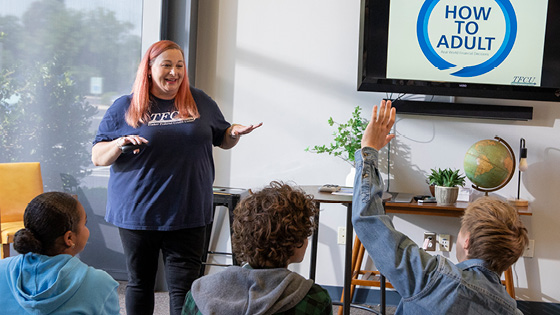Free financial education workshops
Tailored for school groups, employees of businesses and organizations.
Tailored for school groups, employees of businesses and organizations.
TFCU’s experienced financial educators help adults, young adults, teens and kids learn about money management. As a not-for-profit credit union, providing free, tools and tips tailored to your group’s life stage is all part of TFCU’s mission. Our educators are happy to hit the road and travel to your group, or you can choose a virtual workshop. All workshops are approximately 45-60 minutes in length. You can find online brochures and listed topics below.
For questions or to schedule for your school group, employees or organization, please email financialeducationdept@tinkerfcu.org or call 405-319-2598 today!


The choices you make today can often affect how much money you will have in the future. Students will use the PACED model of decision making to learn about basic personal finance concepts like choices, trade-off, opportunity cost and more. Using school prom as a scenario, they will discover the benefits of evaluating and analyzing alternatives before making a choice. (This workshop is an introduction to the Personal Finance Literacy Passport required of all High School graduates in Oklahoma.)

All too often students don’t have the perspective necessary to understand the difficult financial decisions adults have to make. This workshop will pair students together and teach them the basics of household budgeting and decision making. They will receive a profile that includes information about a career, income and deduction information, debt and children. The students then have to make decisions about needs and wants, including housing, transportation, food, childcare, entertainment and more. Through the presentation and activity, they will learn how to create a family budget, and also how their decisions impact their ability to live the life they want.

Credit is surrounded by a lot of myths and misunderstandings. In this interactive workshop, students will pretend to be loan officer and have to decide if an applicant qualifies for a loan. They will learn about evaluating credit reports and credit scores and what factors can affect a person’s financial reputation. This exercise will help them understand what they’ll need to borrow money for a car or home or to get a credit card.

Before you know it, you’ll be in charge of your own finances. Don’t worry, this workshop outlines financial fundamentals like setting goals, making a budget, paying bills, and other real-world skills to prepare you for financial independence.

Gambling can be exciting, challenging and disappointing! This workshop will give students an understanding of the risk and potential costs of gambling. They will experience the thrill and disappointment of playing a game of chance and will learn about managing risk and determining possible outcomes based on probability. Students will also learn to evaluate the benefits of gambling to individuals and society. (This workshop covers the 12th Standard of the Personal Finance Literacy Passport required of all High School graduates in Oklahoma.)

If you are ready to start earning money, learn how to find sources of income now, and how to work towards higher paying or more fulfilling work in the future. We’ll also cover how to understand your first paycheck and what to do with it.

A smart budget helps you cover your expenses and still buy some of the things you want. Find out how to make-and maintain-a budget based on your needs.

Homeownership starts well before the contracts are signed—preparation is one of the keys to a smooth home buying process. This session covers all major pre-purchase topics such as budgeting, the down payment, credit reports, debt-to-income ratios, and the mortgage lending process.

Many decisions go into purchasing a car. Should you buy new or used? Should you buy or lease? Is zero percent financing or taking the rebate better? Learn how to make the best car shopping and financing decisions based on your particular financial situation, credit rating and goals.

Most consumers use credit regularly – in some cases, perhaps too regularly. While credit can be a great financial tool, if it is used unwisely, it can be disastrous. Examine the wisest uses of credit, warning signs of credit trouble and the options available for getting out of debt and reconstructing existing credit to its greatest advantage.

There are numerous benefits to owning your own home. Not only does it provide you with a place to live, but you can also often use the accumulated equity for many money-smart purposes. Borrowing further against your home is a serious financial decision and should only be done after careful research and consideration. This session will discuss the pros and cons of borrowing against your equity and also review the different ways you can do so.

Entrepreneurship is stronger than ever. This session covers all the financial aspects of starting and running a small business. Topics include: types of legal entity structures, writing a business plan, bookkeeping, paying taxes, and everything in-between.

Stretching your budget is a necessary step to achieving your financial goals. Learn smart ways to save on the things that impact your finances most, such as food, health care, insurance and more.

From managing daily expenses to investing for retirement, this session helps participants set personal finance goals, learn the basics of smart money management, and build a solid financial foundation for the future.

We’ll talk about what it means to be financially healthy – which is so much more than just your credit score. True financial health is based on four key components: Spend, Save, Borrow, and Plan. You’ll also confidentially determine your Financial Health Score and the steps to improve that score.

Getting married. Having kids. These are natural progressions in life for many, but also present new financial situations and decisions to make immediately, and for the long term. This session will help you discover, prioritize, and design a workable plan for your family’s goals and lifestyle.

Identify goals, learn how to design realistic spending and savings plans, and discover some options available for getting out of debt.

How is credit scored? Why does my credit matter? Learn what steps to take for obtaining credit, using it wisely and the impact money management has on your future credit standing.

The beginning of the year is a great time to set smart financial goals. This workshop shows you how to use your net worth, emergency savings, consumer debt and 401K contributions as a benchmark, so you can set realistic goals and measure your progress in these areas throughout the year.

There are many important financial milestones for consumers in their 20s and 30s. To help prepare today’s “Millennials” for a positive financial future—without sacrificing fun—we take a realistic approach to managing finances. We’ll cover SMART goals, getting financially organized, building a budget, controlling expenses, wiping out debt, and much more!

Each person has a money personality that influences their spending and saving decisions. Learn how to recognize negative financial habits and attitudes and change them into productive ones.

A job loss, a medical crisis, or other hardship can send a normal financial situation into a tailspin. Participants will learn how to get their finances back on track, including budgeting, repaying debt, rebuilding credit, establishing emergency savings, and replenishing retirement savings.

Technology has made managing your money much more convenient. Whether it’s opening and managing accounts, transferring money or bill pay, you’ll learn the fundamentals of electronic banking.

A financial crisis can throw even the best money management plan into chaos. This session focuses on ways to gain control of a crisis. Participants will learn about financial assessments, expense prioritization, and effective negotiation with creditors.

Today’s youth generation is tech-savvy and connected online. However, parents still play an important role in helping them avoid online hazards such as identity theft, privacy and cyber-bullying. This workshop covers important issues including online privacy tips, managing computer settings, smartphone apps, and positive online behavior.

Enjoy the holidays instead of stressing about them. Learn how to set a holiday budget and stick to it, how to avoid the year-end credit crunch and what to do now to avoid getting into debt in the future.

The Sandwich Generation is positioned in the middle. They care for aging parents while supporting their own children. In this workshop, participants will learn how to manage their parents’ medical, legal and financial needs, while ensuring they stay financially prepared for their kids’ future.

A credit card can be a valuable financial tool. However, before racking up big charges on multiple cards, participants should learn smart ways to handle their credit cards and take a disciplined approach.

How is credit scored? Why does my credit matter? Learn how to review your credit report yearly and the impact money management has on your future credit standing.

Today’s communication technology allows us to access our personal financial information from the palm of our hands. It has made it a lot easier for us to keep track and manage our money in a better way. There are many tools available that provide us with applications to access and automate the process of tracking our finances.
Learn what apps can help you with budgeting, credit score and goal setting.

Big ticket items like TV’s, appliances, or electronics can become a big financial burden for most people. In this workshops we will discuss tips on how to minimize the impact of these purchases.

“I wish I knew this stuff in my 20s!” This is one of the most common phrases we hear, but by the time that we buckle down and take control of our money, we realize how beneficial these financial skills would have been in our 20s and 30s. This workshop will cover ten financial topics every high school student should know before graduating.

This workshop will convey the importance of maintaining good personal credit and how that will help to build business credit. Additionally, how both personal and business reporting can affect the business overall in how lenders and other businesses may view your business. Finally, by utilizing credit reporting services, business owners will understand how to better leverage their business credit.

In this workshop we will identify the general characteristics, advantages, and disadvantages of several different organizational structure options for small businesses. We will examine how each structure is impacted by taxation, liability and risk, management, and more.

This workshop will help you understand how to choose a financial institution based on elements such as resources, customer service, technology, and services, and why it is important to begin your relationship with your financial institution early. You will also learn what other elements need to be understood before beginning this relationship, such as access to funds, transaction security, and the features and risks associated with the institution’s various account options. Finally, we will touch on how to increase your business’ efficiency through banking services such as payroll, cash management, and merchant processing.